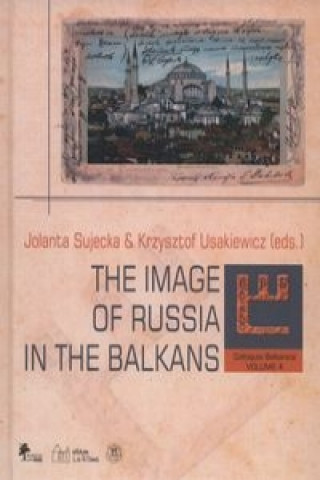
Kód: 13721150
Colloquia Balkanica vol. 4
In some aspects, The Image of Russia in the Balkans continues the first book in the series, The Semantics of Russia in the Balkans, though the present volume definitely contains more extensive material and covers more issues. The ... celý popis
- Jazyk:
 Angličtina
Angličtina - Vazba: Pevná
- Počet stran: 296
Nakladatelství: DiG, 2016
- Více informací o knize

Mohlo by se vám také líbit
-

Dune
217 Kč -

Haunting Adeline
620 Kč -

Berserk Deluxe Volume 2
1092 Kč -

White Nights
93 Kč -

Powerless
260 Kč -

Atomic Habits
493 Kč -

Dune Messiah
183 Kč -

Berserk Deluxe Volume 3
1142 Kč -

One Day
218 Kč -

Berserk Deluxe Volume 1
1115 Kč -

Iron Flame
354 Kč -

Surrounded by Idiots
316 Kč -

Harry Potter and the Prisoner of Azkaban (Minalima Edition)
993 Kč -

Gravity Falls Journal 3
440 Kč -

Heaven Official's Blessing: Tian Guan Ci Fu (Novel) Vol. 1
440 Kč -

The Creative Act
426 Kč -

Dune
204 Kč -

Hunting Adeline
642 Kč -

A Little Life
267 Kč -

Children of Dune
230 Kč -

Heaven Official's Blessing: Tian Guan Ci Fu (Novel) Vol. 2
414 Kč
Informovat o naskladnění knihy
Zadejte do formuláře e-mailovou adresu a jakmile knihu naskladníme, zašleme vám o tom zprávu. Pohlídáme vše za vás.
Více informací o knize Colloquia Balkanica vol. 4
 Anotace knihy
Anotace knihy
In some aspects, The Image of Russia in the Balkans continues the first book in the series, The Semantics of Russia in the Balkans, though the present volume definitely contains more extensive material and covers more issues. The image of Russia presented in the papers making up the volume, though multi-themed, seems to split into two main types depending on ethnogenesis and language on the one hand and religion on the other. One might think that there is a Slavic image of Russia, which involves the Slavic cultures of the Balkans, and an Orthodox image, which is Greek and to some degree Albanian and Romanian. This would be the result of the dual discourse developed by Russia with regard to the Balkans that Pedro Bádenas de la Pena writes about. Meanwhile, Balkan images of Russia create more of a multi-layered structure subordinated to Balkan cultural perception while also conducting a dialogue with Russia and its legacy. Developing from the Byzantine tradition, the Balkans and Russia essentially form a space of mutual ties that goes far beyond the cliché of liberator and liberated. Opening up to influences coming from South-Eastern Europe in times when the Ottoman threat was increasing, Russia in a way repaid its "debt" incurred in the early 18th century by sending teachers and books to the Habsburg town of Karlowitz (Sremski Karlovci, Karlovatz). (...) Thus everything came full circle: having taken in refugees from South-Eastern Europe, Russia (...) returned to Turkish Europe, to the Balkans, as a player but also an ideologue, wanting to liberate but also to decide. The only thing is, contrary to the European powers, Russia was a part of that world, which is why its role in the Balkans was different, and this is what the present volume sets out to show.
 Parametry knihy
Parametry knihy
Zařazení knihy Knihy v polštině Nauki społeczne, humanistyczne, ekonomiczne Historia. Archeologia Historia poszczególnych krajów i krain
- Plný název: Colloquia Balkanica vol. 4
- Jazyk:
 Angličtina
Angličtina - Vazba: Pevná
- Počet stran: 296
- EAN: 9788371819728
- ISBN: 8371819722
- ID: 13721150
- Nakladatelství: DiG
- Hmotnost: 582 g
- Rozměry: 230 × 160 mm
- Datum vydání: January 2016
Osobní odběr Praha, Brno a 12903 dalších
Copyright ©2008-24 nejlevnejsi-knihy.cz Všechna práva vyhrazenaSoukromíCookies



 Vrácení do měsíce
Vrácení do měsíce 571 999 099 (8-15.30h)
571 999 099 (8-15.30h)